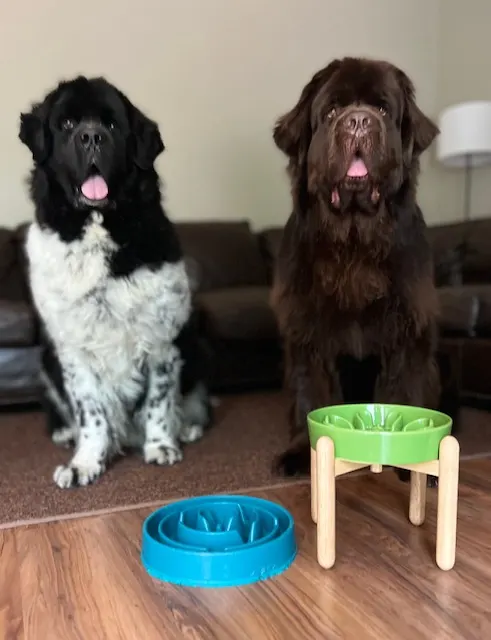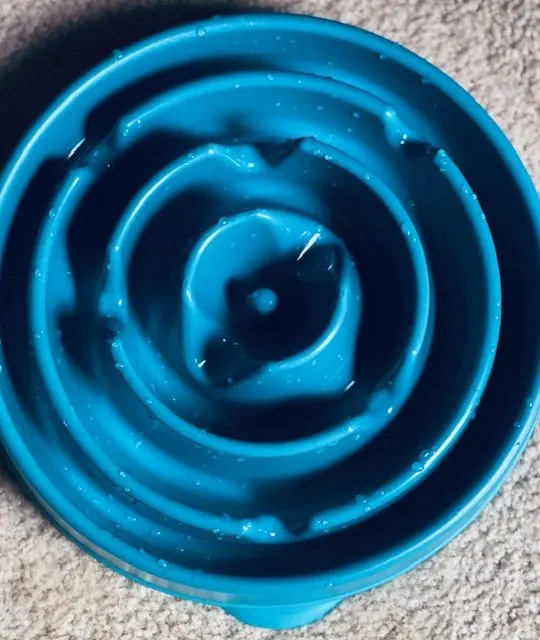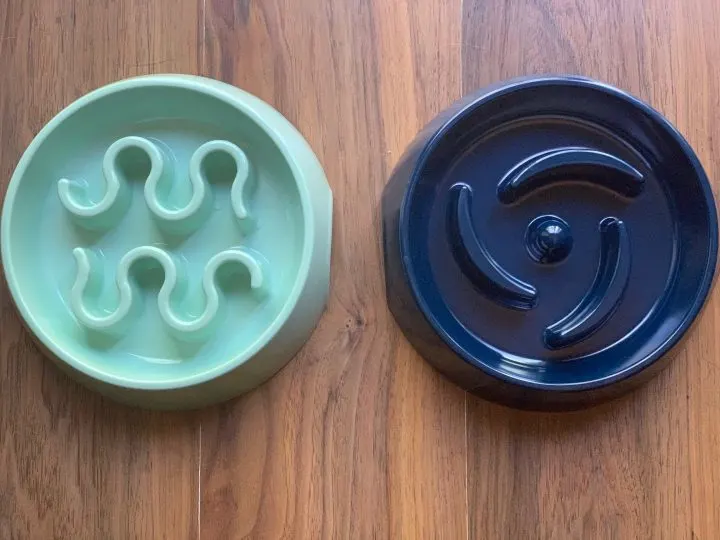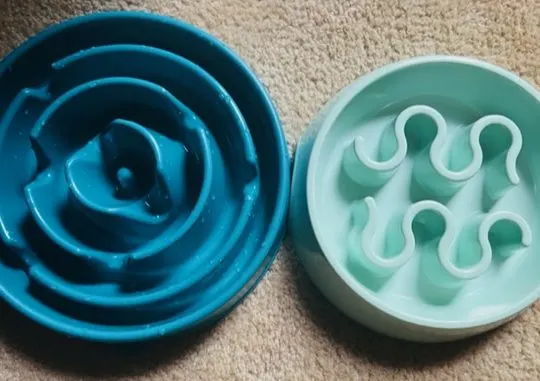Ever since we brought Lou home, he’s been a speed eater.
As quickly as his bowl of food was put down, he would gobble it down.
I didn’t know he was going to be a speed eater, so all I had was regular stainless steel dog bowls for him.
I thought maybe that he would grow out of it because he was a puppy, but he didn’t so now all of Lou’s meals are fed to him in a slow feeder dog bowl.
If you’ve been wondering if you should invest in a slow feeder dog bowl for your puppy or dog, we’ve broken down all the pros and cons of adding a slow feeder bowl to your dog’s feeding schedule.
I’ve also included what dogs might benefit by using a slow feeder bowl, if a product like this is a good choice for a dog or puppy that eats too fast and how slow feeder products work.
What Is a Slow Feeder Dog Bowl?
A slow feeder is a dog bowl that is designed with obstacles that your dog has to eat around.
There are several different sizes and designs of slow-feeder dog bowls available to dog owners.
There are bowls designed for puppies, adult dogs, senior dogs, small dogs and big dogs.
Slow feeder bowls are designed with slow eating in mind!
They have built-in ridges, grooves, pockets and/or raised areas that help to keep your puppy or dog from eating their food in seconds.

Slow feeder bowls are kind of like puzzles for dogs.
Instead of smashing their face into an open bowl of food, they have to lick or scoop out the food along the path and obstacle of the bowl.
Since they have to think about this and be kind of accurate with their mouth, it takes them longer to eat.
Are Slow Feeders Good for Dogs?
You betcha!
Slow feeder dog bowls are a great option to help dogs that have poor eating habits.
A few benefits that slow feeder bowls offer to dogs are:
- help with common behavior issues seen in dogs such as resource guarding
- help to reduce the chances of dog bloat
- reduce and/or prevent acid reflux
- decreases the risk of choking
- reduces vomiting
- reduces vomiting in dogs
- provides mental stimulation for puppies and senior dogs
Slow feeder bowls can also be used with raw dog food or kibble making them a versatile feeding tool for all dog owners.
Do These Bowls Really Work For Dogs?
In my personal experience, they do!
I’ve used a slow feeder bowl with Lou ever since he was a puppy and I noticed how fast he ate.
Having a feed that is at risk for dog bloat was a big concern for me and a common dog behavior that I wanted to put a stop to as soon as possible.

Does Your Dog Need a Slow Feeder Dog Bowl?
Not every dog needs a slow-feeder dog bowl.
I have 3 dogs and only one dog inhales his food so only one dog uses a slow feeder bowl.
If you think your dog is eating too quickly then a slow feeder bowl may be what you need.
Before you invest in a slow feeder bowl or make your own DIY slow-feeder dog bowl, it’s important to determine if they really need it.
If your dog is eating too fast, the first step is to take a look around and figure out the reason why they’re eating like this
There are a ton of reasons why dogs eat too fast but some of the more common reasons are:
Common Reasons Why Dogs Eat Too Fast:
- Hunger. Some dogs are more hungry than others, especially puppies. If your puppy or dog is acts super hungry and they’re not gaining weight, you should check how much you’re feeding based on their age, weight and breed. Reach out to your veterinarian if you have any questions or concerns.
- Health issues. There are several underlying health issues that can cause dogs to be more hungry than they should. These include but are not limited to parasites, thyroid issues, diabetes and Cushings.
- Competition. If you have more than one dog like me, one of your dogs might think it’s a game to see who can eat the fastest and get outside the quickest. I feed my dogs in separate areas to avoid issues like this but they’re not behind closed doors so they still know that they’re all eating at the same time.

We hope that you like the products we featured in today’s post. Just so we’re clear, My Brown Newfies is a participant in the Amazon LLC Associates Program, an affiliate advertising program designed to provide a means for sites to earn advertising fees by advertising and linking to Amazon.com and other affiliate programs:)
On the opposite end, some dogs that eat too slow or don’t show interest in their food might also benefit from a slow feeder because it represents a challenge for them.
If none of these things sound like your dog but they still eat fast, a slow feeder is still a great option.
Why Should Dogs Eat Slower Over Faster?
When dogs eat too fast they gulp down too much.
This air that they swallow makes its way into their stomach.
Too much air in the stomach can cause discomfort and even worse, it can cause the stomach to bloat.
When the stomach bloat from too much air, it can twist.

This twist is called GDV or gastric dilated volvulus and when this happens it cuts off blood supply to the rest of the dog’s body which can be fatal.
Even a small amount of air can cause dog farts or dog burps.
Besides air in the stomach, dogs that eat too fast can also choke on their food, vomit or gag.
Can Puppies Use Slow Feeder Bowls?
Yes!
Lou has used a slow feeder bowl since he was 10 weeks ago.
I had to purchase different sizes as he grew, but that’s the way he’s always eaten his meals.
If you start your puppy off eating from a slow feeder bowl, you will probably have to upgrade to bigger sizes as they grow.

Pros and Cons of Slow Feeder Dog Bowls
As with any dog product, slow feeder dog bowls have their own set of pros and cons and they won’t work for every dog.
However, when used correctly and for the right dog slow feeder bowls have many pros!
Pros Of Slow Feeder Bowls For Dogs
- Slows down a dog from eating too fast
- Reduces gas and air in the dog’s stomach which in turn reduces the risk of dog bloat in some breeds.
- Provides stimulation. Might help with those dogs that don’t seem interested in eating, like those healthy adult dogs that all of a sudden just don’t want to eat the food you put in their food bowl but have no problem eating dog treats or begging for whatever you’re eating!
- Reduces choking, gagging and vomiting
- Portion control. If your dog needs to go on diet, slow feeder bowls make it easy to portion out their food. It will also take your dog longer to eat their food which will make you feel less guilty about feeding a smaller amount.

Cons Of Slow Feeder Bowls For Dogs
- They can be expensive. Slow feeder dog bowls are most expensive than basic dog food bowls and you might have to buy them more frequently as your dog grows.
- Some dogs just aren’t going to use them. Some dogs will just flip them over and eat the food off the floor, which will still slow them down!
- Dogs with flat faces might have more difficulty using a slow fooder because of the tight spaces. In cases like this, it might be more effective to make your own slow-feeder or use a lick mat or snuffle mat.
- Slow feeders can be more of a challenge to find for big dogs. There are tons of slow feeders on the market but only a handful are made for big breed dogs.
- Can actually discourage some dogs. Some dogs might be discouraged with a slow feeder dog bowl especially if they’re a senior dog. It’s important to start off slow and match the bowl to the dog.
What Type Of Slow Feeder Bowl Should You Get?
Slow feeder dog bowls come in a wide range of style, shapes and materials and picking one out might be trial and error at first.
I went through quite a few in the beginning with Lou!
There are plastic, ceramic, stainless steel and even slow feeder inserts that you can get for your current dog bowls.
There are even slow feeder Neater Feeders!
The type of bowl you get will greatly depend on your dog’s size, age and eating habits.
I did not have luck with the slow feeder inserts. They didn’t stay stuck to the bowl and they weren’t big enough.

I found a really good slow feeder bowl for Lou when he was a puppy at Petco and I ordered 4 of them. ( just a note to my fellow Newfie owners, the large is good for a Newfie puppy (3-6 months) but is not big enough for an adult Newfie.)
When he outgrew those I went with this one from Outward Hound. and I recently purchased this elevated ceramic elevated dog feeeder.
The only caution I would use with ceramic slow feeder dog bowls is that I’ve heard of enthusiastic dogs breaking or chipping their teeth.
When Should a Dog Slow Feeder Be Used?
If you’ve decided that a slow feeder bowl is the way to go for your dog, it should be used each time that they’re fed.
It’s recommended to feed most adult dogs twice a day, once in the morning and once in the evening.
Their daily feeding guideline should be broken up into 2 feedings.
For example, Lou gets fed 4 cups of food a day right now so he gets 2 cups of food in the morning and 2 cups of food at dinner time.
His dog food is put into his slow feeder bowl along with other mix-ins that I feed.

Final Thoughts
Not every dog needs a slow feeder bowl but some dogs can definitely benefit from them.
Lou is my first-speed eater so unless he shows signs of slowing down his eating habits as he gets older, I’ll continue to use one for him.
I’m a little addicted to all the fun slow feeders that are out on the market but I try to make smart purchases since not all slow feeders are designed for big dogs.
I only endorse and recommend products that I personally use or products that come highly recommended by my peers. Please don’t spend money on any of these products unless you believe they are best for you and your Newfoundland. Read our full privacy policy here.